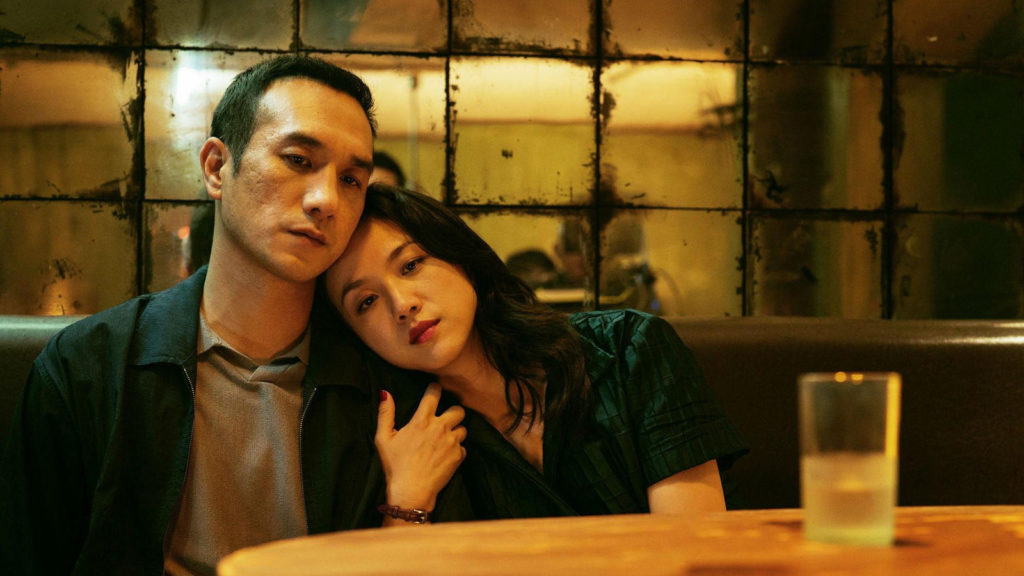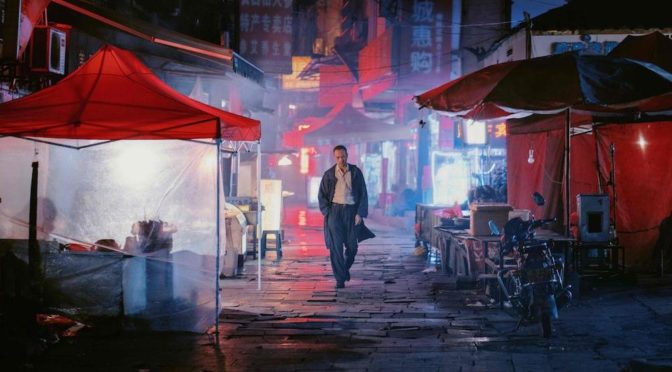There are movies that you try to piece together and there are movies that you give yourself over to. Long Day’s Journey Into Night is the latter. The film initially presents itself in the vein of a film noir. Luo Hongwu (Hang Jue), a middle aged man, returns to his hometown to look for a former lover (Tang Wei; Lust, Caution) who has never left his thoughts. But director Bi Gan (Kaili Blues) is not a traditional storyteller. He is more interested in Luo’s memories and emotions than anything else.
Anyone looking for an explicit narrative will be disappointed. As Luo looks for his former lover, the film constantly jumps around in the timeline. Establishing a chronology can be difficult outside of Luo’s graying hair and the narrative may leave some viewers perplexed. It has the unfortunate side effect of making the central relationship difficult to understand, but the structure is dictated by Luo’s state of mind. As a man searching for a connection to his past, the scenes play out like fragments of his memory triggered during his pursuit.
The dreamlike tone is accentuated throughout. Much of the film is shot at night with wet, reflective surfaces all around, establishing an ethereal atmosphere. Bi relies on the hushed tones of Luo’s voiceover rather than dialogue. His inner thoughts are poetic ruminations on memory and are a unique blend of Wong Kar-Wai, Terrence Malick, and Apichatpong Weerasethakul along with Bi’s own brand of introspection. It may test the patience of some, but the film’s deliberate pacing and mood are essential to its themes.

There’s been a lot of hype surrounding the film’s 1 hour long take and I’m pleased to say it deserves every bit of praise it has received. Long Day’s Journey Into Night is not a 3D film, as an opening title card states, but when Luo visits a local movie theater he puts on a pair of 3D glasses and the audience does as well. The following long take is nothing short of astounding. Bi orchestrates an extended sequence of mind-boggling complexity, recalling and even surpassing many famous long takes like the opening of Touch of Evil. The camera follows characters on vehicle, down a zipline, soars over a town center, and into many buildings. There are several actions during the take that would be perilous to completing the shot, like precise plays during a game of pool, and at some point it becomes the cinematic equivalent of watching a high-stakes tightrope walk.
That’s not to say that Bi uses his long shot as a gimmick. It’s an immersive, surreal experience, essentially a lucid dream. The camera floats around the events, observing from nearby in an almost out-of-body experience, like the roaming camerawork from Enter the Void. It further demonstrates the director’s enormous talent and serves as a fitting coda to a feature that has little interest in explicit plot. Bi ends his film with this astounding sequence that emphasizes the enveloping nature our subjective memory and the lasting impact it can create long after events have transpired. It’s an awe-inspiring feat that will mesmerize viewers willing to accept it on its own terms.

4/5 stars.
